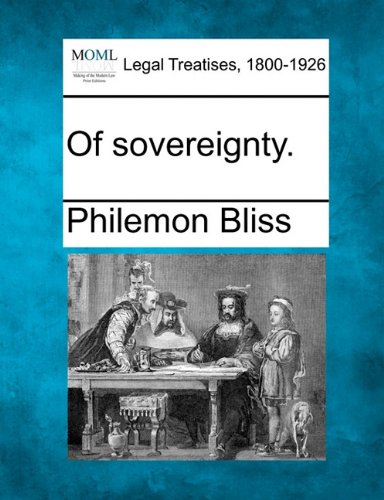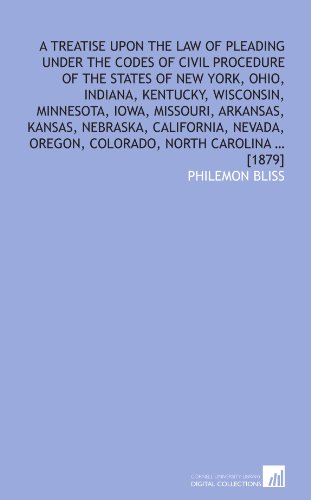Background
Philemon Bliss was born on July 28, 1814, in Canton, Connecticut, United States, of early Puritan stock through both parents, Asahel and Lydia (Griswold) Bliss. The family moved to Whitestown, New York, in 1821.



( The Making of the Modern Law: Legal Treatises, 1800-192...)
The Making of the Modern Law: Legal Treatises, 1800-1926 includes over 20,000 analytical, theoretical and practical works on American and British Law. It includes the writings of major legal theorists, including Sir Edward Coke, Sir William Blackstone, James Fitzjames Stephen, Frederic William Maitland, John Marshall, Joseph Story, Oliver Wendell Holmes, Jr. and Roscoe Pound, among others. Legal Treatises includes casebooks, local practice manuals, form books, works for lay readers, pamphlets, letters, speeches and other works of the most influential writers of their time. It is of great value to researchers of domestic and international law, government and politics, legal history, business and economics, criminology and much more. ++++ The below data was compiled from various identification fields in the bibliographic record of this title. This data is provided as an additional tool in helping to insure edition identification: ++++ Harvard Law School Library ocm18770362 Boston : Little, Brown, 1885. xv, 180 p. ; 21 cm.
https://www.amazon.com/sovereignty-Philemon-Bliss/dp/1240086490?SubscriptionId=AKIAJRRWTH346WSPOAFQ&tag=prabook-20&linkCode=sp1&camp=2025&creative=165953&creativeASIN=1240086490

(Originally published in 1879. This volume from the Cornel...)
Originally published in 1879. This volume from the Cornell University Library's print collections was scanned on an APT BookScan and converted to JPG 2000 format by Kirtas Technologies. All titles scanned cover to cover and pages may include marks notations and other marginalia present in the original volume.
https://www.amazon.com/treatise-pleading-procedure-Wisconsin-Minnesota/dp/1112578765?SubscriptionId=AKIAJRRWTH346WSPOAFQ&tag=prabook-20&linkCode=sp1&camp=2025&creative=165953&creativeASIN=1112578765
Philemon Bliss was born on July 28, 1814, in Canton, Connecticut, United States, of early Puritan stock through both parents, Asahel and Lydia (Griswold) Bliss. The family moved to Whitestown, New York, in 1821.
Philemon attended the academy in Whitestown, New York, and Oneida Institute, but lack of funds compelled him to withdraw from Hamilton College in his sophomore year, and ill health cut short his training in a local law office.
Philemon Bliss began the active practise of law at Elyria, Ohio, in 1841. His public career began in 1849 with his election by the Ohio legislature as judge of the 14th judicial district where he served until 1852. Of Federalist and Whig antecedents, he had campaigned actively for Clay in 1844, but his pronounced antislavery views carried him into the Free-Soil party in 1848 and later into the Republican. In 1854 he was elected to Congress from a formerly Democratic district and was re-elected in 1856. His dislike of controversy and his weak voice - he struggled all his life against bronchial and pulmonaryweakness - unfitted him for debate, but his set speeches are able statements of the advanced antislavery, anti-state-sovereignty views. In 1861 he accepted an appointment as chief justice of Dakota Territory, hoping that the drier climate would relieve his throat trouble. Two years later he resigned, and coming to Missouri with improved health, in 1864, he brought his family to St. Joseph. Here he served as probate judge and as a member of the county court of Buchanan County; in 1867 he was appointed a curator of the state university, serving until 1872 and taking an active part in its reorganization.
In 1868 Bliss was elected to the state supreme court for a four-year term on the Radical or Republican ticket, and won the respect and confidence of all parties in a time of great political bitterness. The dominance of the Democratic party after 1872 ended his political career. In that year the curators of the university appointed him first dean of the newly created department of law, which position he held until his death in 1889. He died at St. Paul, Minnesota, whither he had gone for his health, and he was buried at Columbia, Missouri.
In spite of his lifelong struggle against physical weakness and his retiring disposition, Bliss gave a great and well recognized service in the training of the post-bellum generation of lawyers, and in the restoration and advancement of the standards of the legal profession in Missouri. His sound legal knowledge is evidenced by his Treatise upon the Law of Pleading under the Codes of Civil Procedure (1870), a text nationally used and frequently revised until superseded by the modern case method.
( The Making of the Modern Law: Legal Treatises, 1800-192...)
(Originally published in 1879. This volume from the Cornel...)
While a man of decided convictions and unquestioned intellectual courage Bliss was a lifelong Republican in a state and community intensely Democratic. He was a member of the U. S. House of Representatives from Ohio's 14th congressional district from 1855 to 1859.
Bliss had an essentially judicial and peaceful temperament.
In 1843, Philemon Bliss married Martha W. Sharp.
